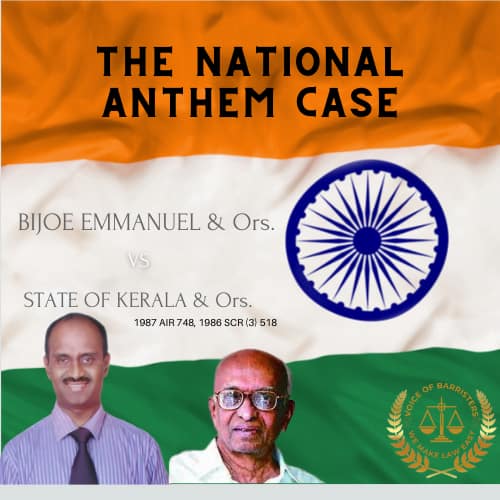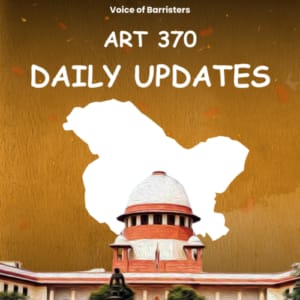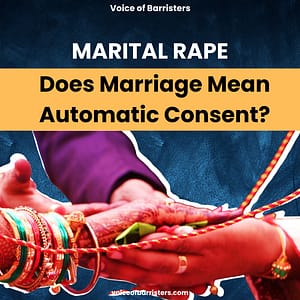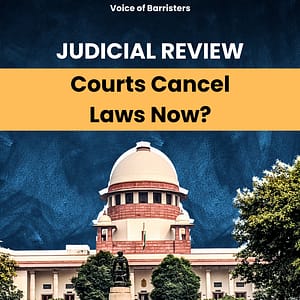BIJOE EMMANUEL & Ors. Vs STATE OF KERALA & Ors.
6 min read
CITATION: 1978 AIR 748
COURT: Supreme Court of India
CORAM: Justice O. Chinnappa Reddy

INTRODUCTION
A National Anthem is a song of patriotism that symbolizes and eulogizes the history and tradition of a nation. They are played on national holidays and some sporting events. They reflect the history, traditions and culture of the nation and give its citizens a sense of national identity. Jana Gana Mana is the National Anthem of India.
It was composed by Rabindranath Tagore. The primary stanza of the song Bharoto Bhagya Bidhata was adopted by the Constituent Assembly of India as the National Anthem on 24 January 1950[1]. In many countries including India, the National Anthem is played at school during the morning assembly to students as an exercise to patriotism.
There are many controversies among the citizens regarding the observance of proper decorum while singing or playing the National Anthem. Bijoe Emmanuel vs. State of Kerala[2] is one such case. In this case, students of a school in Kerala were expelled for refusing to sing the national anthem because it was against the tenets of their religious faith. The father of the children filed a writ petition in the Kerala High Court seeking to restrict authorities from holding back their school attendance.
The petition was dismissed by the judicature as they concluded that there have been no words or thoughts that would offend anybody’s religious sentiments. A special leave petition was filed in the Supreme Court by the father of the children and therefore the court found that the children’s right to freedom of expression was infringed when they were expelled from the school even though the children did not join in singing the National Anthem, they stood up in respect.
FACTS OF THE CASE
The appellants, 3 children, studied in a school in Kerala. They attended school daily and took part in the morning assembly. But when the National Anthem was sung, they did not join in singing but stood respectfully. Their two elder sisters also studied in the same school and followed the same practice and nobody objected them.
In July 1985, a patriotic gentleman who was a Member of the Legislative Assembly noticed and thought it was not patriotic of children not singing the national anthem. He raised a question and a commission was set up to enquire. The Commission reported that the children were law-abiding and did not disrespect the national anthem. However, the headmistress expelled the children under the instructions of the Deputy Inspector of School.
The reason children did not sing the national anthem was that they belonged to a sect named Jehovah’s Witnesses who believe that God, Jehovah, is the supreme ruler of the Universe. They desisted from singing only because their religion does not permit them to engage in any rituals except to be in prayers with God.
The father of the children filed a writ petition in the Kerala High Court against the school authorities seeking to restrain them from preventing their school attendance. The petition was rejected by both the single learned judge and the division bench. Then, the father of the children appeared before the Supreme Court by Special Leave Petition under Article 136 of the Constitution.
ISSUES RAISED
1) Whether the expulsion from the school was consistent with the rights guaranteed by Article 19(1) (a) and Article 25 of the Indian Constitution
2) Whether the expulsion of students under the Kerala Education Board (Section 36), Kerala Education Rules (Rule 6 and 9), and Section 3 of Prevention of Insults to National Honour Act 1971 justified?
JUDGEMENT
Before dealing with the merits of the case, the court discussed several cases on civil liberties of Jehovah’s Witnesses in the United States and Canada and held that even though the faith of the people may appear strange or even bizarre, the sincerity of their beliefs is beyond question.
The main issue before the Court was whether the expulsion of children from school for their refusal to sing the national anthem was consistent with Article 19(1)(a) and Article 25(1). The reason to compel every student to participate in the singing of the National Anthem despite his/her genuine concern and their conscientiously held religious faith would violate their religious belief clearly breaches the right guaranteed by Article 19(1)(a) and Article 25(1) of the Constitution of India. The reasoning behind this judgement is that there is no provision of law that obliges anyone to sing the National Anthem and is not disrespectful when a person respectfully stands when the National Anthem is sung but does not join in singing.
Kerala Education Authorities relied upon two circulars of September 1961 and February 1970 issued by the Director of Public Instruction, Kerala. The former relates to the code of conduct of teachers and pupils and gives the importance of moral and spiritual values while the latter gives instructions that schools shall conduct morning assembly followed by the singing of the National Anthem and taking of the National Pledge.
In the context of Article 19(1)(a) the court relied on the precedent of the constitutional bench in Kharak Singh v. the State of U.P[3] and Kameshwar Prasad v. the State of Bihar[4] and held that these applicable regulatory measures made by the State of Kerala’s Department of Education for compulsorily singing the national anthem in schools had no legal sanction in the sense that they were not issued under any statute.
These circulars amounted to mere “departmental instructions” and thus, they lacked statutory force within the meaning of Article 19 of the Constitution to place restrictions on the right to freedom of expression. The court also took notice that these circulars did not oblige every individual to sing even if he has any conscientious objection based on his religious belief nor is there any penalty attached to not joining in the singing.
The Court further discussed the applicability of Section 2 and Section 3 of the Prevention of Insults to National Honors Act of 1971, which deals with the National Flag, Constitution of India and National Anthem respectively, under which “Whoever, intentionally prevents the singing of the National Anthem or causes disturbance to any assembly engaged in such singing shall be punished with imprisonment for a term which extends to three years or with fine, or with both.”
The court held that standing up and not singing does not prevent singing or cause disturbance to an assembly engaged in singing to constitute an offense under this Section.[5]
Therefore, the court directed the respondent authorities to re-admit the children into the school, to permit them to pursue their studies without hindrance, and to facilitate the pursuit of their studies by giving them necessary facilities.
ANALYSIS
The judgement given by the Supreme Court is very appreciative and serves as a good precedent. The students not participating in the singing of the national anthem cannot be considered wrong or bad as they had justification for their action which was protected under Article 19 and 25 of the Constitution.
Jehovah’s Witnesses believe that whenever there is a conflict between the laws of Almighty and laws of man, the Christian must always choose God’s law over man’s law. In the instant case, appellants obeyed their religion and at the same time respected the National Anthem by standing erectly and respectfully. Hence, the court’s decision to not consider their action immoral and an insult to the National Honor is much correct and provides relaxation in mandatory singing of the national anthem.
The court, while accepting that singing was not an important rule of showing respect, declined to give unqualified rights to the members of Jehovah’s Witnesses against the National Anthem which would otherwise have endangered the security of the Nation. The court stated that an unqualified discretion would develop a tendency to ignore the mandates of the Constitution among the citizens.
The Supreme Court has cleared its stance but the issue continues to surface. Two years back, in Mumbai, a couple was forced to leave a cinema hall because they didn’t stand up for the National Anthem when it was being played on the screen.
Citizens should definitely respect the national anthem but the way they choose to do so should not be forced as long as it is acceptable.
CONCLUSION
This case is a classic example of the State interfering in citizen’s fundamental right to free speech and expression and freedom of religion. But the Supreme Court is the guardian of the Indian Constitution, remarkably did its job by stopping the people’s rights from getting violated
[1] www.wikipedia.org(last visited on June 2, 2021)
[2] AIR 1987 SC 748
[3] 1963 AIR 1295, 1964 SCR (1) 332.
[4] 1962 AIR 1166, 1962 SCR Supl. (3) 369.
[5] https://globalfreedomofexpression.columbia.edu/cases/emmanuel-v-state-of-kerala/(last visited on June 7, 2021)






